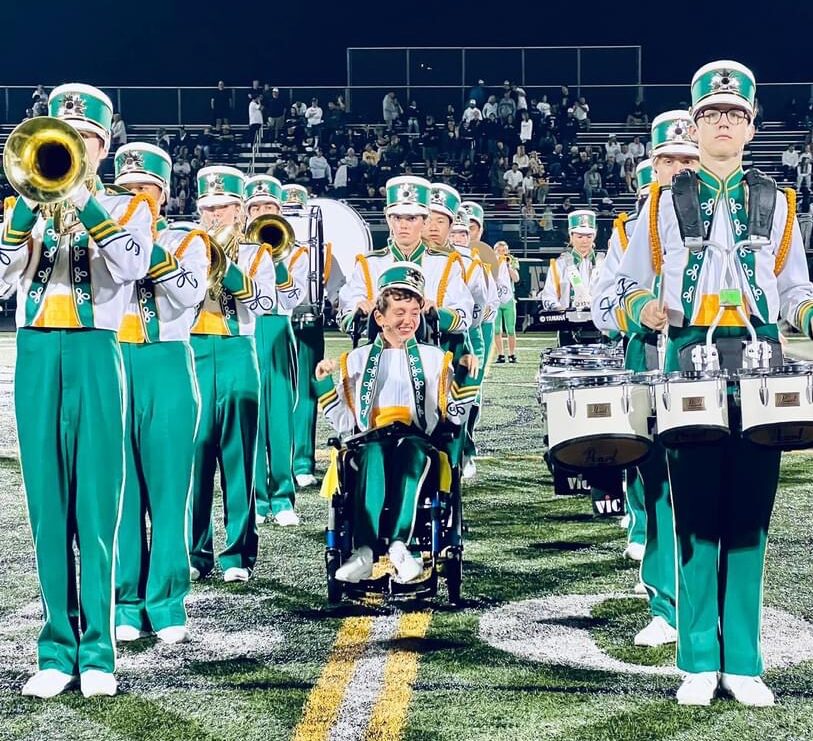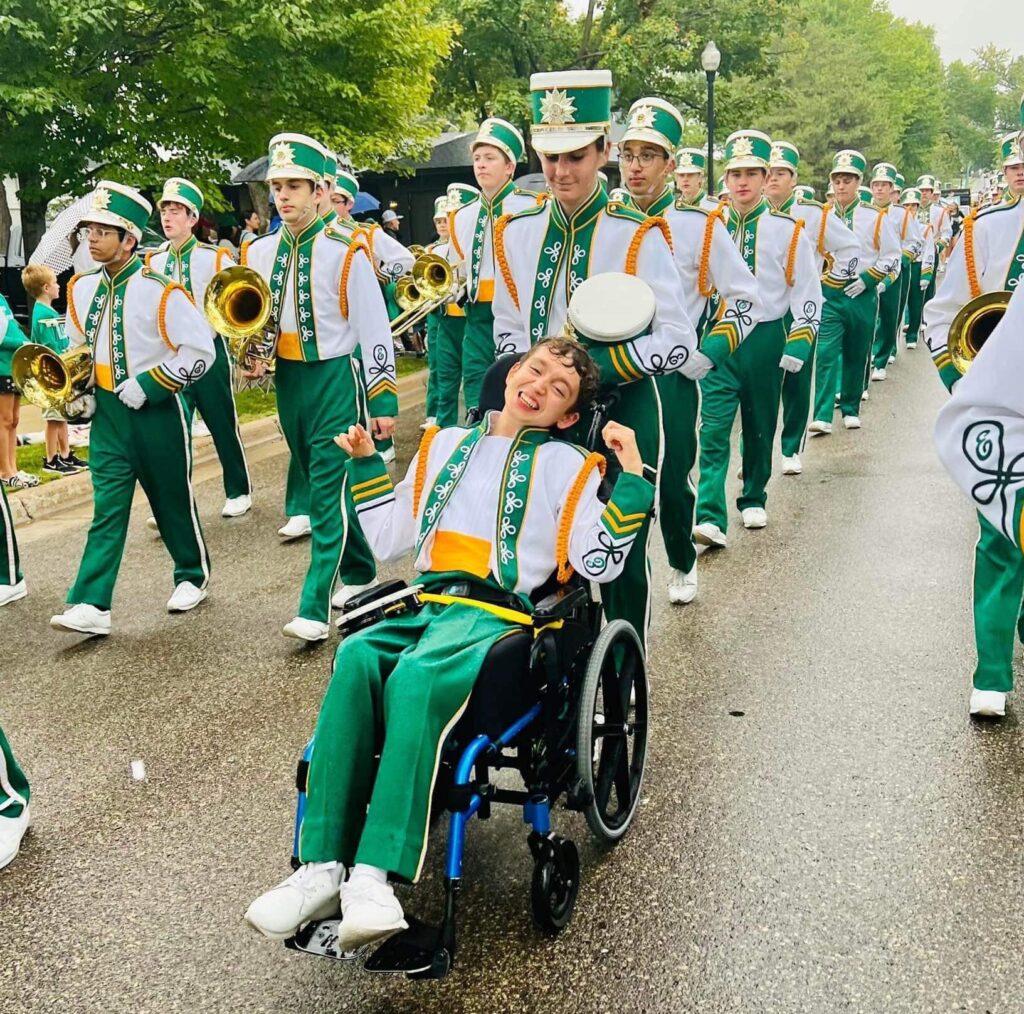Oskar Marches On with Caregivers by His Side
Accra’s PCA Choice and 245D programs allow Oskar to embrace life as a high schooler while taking the load off of his mother Blake
“When you have a kid with special needs, every parent reinvents the wheel. There’s no kid like your kid. You’ve never done this before. You can’t really ask people for advice.”
Blake Kelly started reinventing the wheel 15 years ago. At 18 months old, her son Oskar was diagnosed with an exceedingly rare condition called 5q14.3 Microdeletion Syndrome, which has been diagnosed in fewer than 1,000 Americans.
5q14.3 Microdeletion Syndrome is characterized by intellectual disability, absent speech, stereotypic movements and seizures. Given Oskar’s symptoms, Blake needed some extra help.
“He’s very healthy and happy, but he can’t talk and he can’t walk, and he can’t feed himself. So, we use a lot of PCA care around here,” Blake said.
Even with quality caregiving support, managing a full-time job while also caring for a child with a disability is a challenge.
“I end up crying a lot of the times on the weekends because it’s so overwhelming to work all week and then spend your whole weekend doing laundry and cooking,” Blake said. “You just don’t even get a chance to catch your breath.”
Needing to supplement her PCA support with respite services, Blake turned to Accra.
Making the Switch
Now 16 years old, Oskar receives Personal Care Assistance (PCA) Choice services and 245D Waivered Services, including Respite and Homemaker services, through Accra. Oskar’s PCAs help with laundry, bathing, dressing, meal preparation, taking him to and from appointments, and more.
“I’m older so it’s just really hard for me to do that by myself. It’s really great to have the help,” Blake said. “There’s just a lot of laundry and cooking that come with some kids with special needs.”
Oskar has unique dietary needs since he cannot feed himself, and his Accra caregivers help Blake with preparing his meals.
“We cook big batches and then we freeze it in muffin tins,” Blake said. “Big batches of frozen zucchini and frozen sweet potatoes and frozen chicken so that when it comes time to make his food, we just throw the pucks in the microwave and mix them up... But that just takes a lot of time. It takes a lot of hours.”
On Saturdays, a PCA typically takes Oskar out into the community to some of his favorite places like the Sea Life Aquarium, the science museum or the movie theater. In the summer, they like to ride bikes or go swimming.
One of Oskar’s PCAs has been caring for him for four years now, and that consistency has made a world of difference.
“She knows him so well. She knows when he’s having seizures, when he doesn’t feel good,” Blake said. “I totally count on her. I don’t know what I would do without her.”
With dependable long-term caregivers by Oskar’s side, Accra’s respite services allow Blake to take work trips, go on the occasional vacation and avoid the exhaustion she feels from all that she is juggling.
“The respite care that I am able to access through Accra is lifesaving,” Blake said. “I can’t imagine the burnout if I could never spend a night away.”
Too Cool for School


Now a sophomore at Edina High School, Oskar is thriving in class, and he participates in unified physical education, theater and music therapy. Music happens to be one of his greatest passions.
“He loves music, he loves any kind of music. So, in the summer, we go to the Lake Harriet Bandshell or wherever they’re playing live music, and he just loves it.”
Naturally, Oskar was drawn to the marching band.
“He’s probably the first kid in a wheelchair ever to be in marching band at Edina,” Blake said. “When they’re performing, and he’s being pushed along with the band, and the drums are right behind him, he’s in heaven, you can just see it on his face.”
Oskar also loves to joke around. He has an Eyegaze communication device with pre-programmed messages, so he can communicate with his peers. Some of the messages are necessary, like “I’m thirsty,” and others are funny slang that his older sister programmed like “that’s fire.”
“He is the best nonverbal comedian you have ever met,” Blake said. “One day in music therapy, the teacher was playing music and he navigated to ‘Hey, I have to tell you something.’ The teacher stopped the whole class, and he navigated three pages in to make it say, ‘Would you stop singing already?’ The whole class laughed. I’m like ‘Man, that’s a long way to go for a joke with your eyes, nonverbal,’ but it was very funny.”
Creating A Caring Network
Shortly after Oskar was diagnosed with 5q14.3 Microdeletion Syndrome as an infant, Blake started documenting her son’s journey via blog posts. A woman in Australia, whose son was diagnosed with the same condition, came across Blake’s posts. The two immediately connected and started a Facebook group for individuals with 5q14.3 Microdeletion Syndrome.
Over the years, more and more people have found this online community. Now the group has about 250 members, sharing their experiences, advice and tips for other families navigating life with 5q14.3 Microdeletion Syndrome.
“What’s so great about our Facebook group is that people can ask each other for advice,” Blake said. “And there’s people that are leading the way, and there’s younger kids and we support each other.”
The network of support and online community that Blake has built represents a stark contrast to what Oskar’s experience might have been in the past.
“I’ve had two neighbors tell me they had brothers with disabilities in the 70s, when the doctors would tell the parents ‘Well, you know, you should institutionalize them. He’s never going to be able to do anything.’ They laid in bed and sat in rooms all day; it just makes me want to cry. I can’t imagine a kid like Oskar who loves life so much… lying in a bed, staring out a window all day. It just breaks my heart,” Blake said. “Thank God there’s people who change that and challenge that and want to work with kids like Oskar.”
